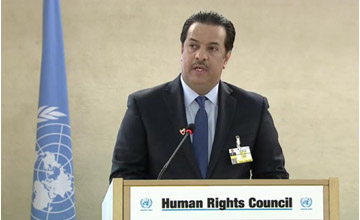ID :
482883
Thu, 03/01/2018 - 01:54
Auther :
Shortlink :
https://www.oananews.org//node/482883
The shortlink copeid
Bahrain’s human rights strides outlined

Geneva, Feb. 28 (BNA): The Assistant Foreign Minister, Abdullah bin Faisal bin Jabur Al Doseri, affirmed that the Kingdom of Bahrain has achieved pioneering strides in the fields of democracy and guaranteeing the rights and public and personal freedoms of all citizens, men and women, including freedom of opinion and expression, religious freedom, the right to political and economic participation, the preservation of human dignity and the establishment of equality among all citizens before the law in public rights and duties, without discrimination on grounds of race, origin, language, religion or creed.
He noted that the pioneering civilizational initiatives taken by His Majesty King Hamad bin Isa Al Khalifa to promote tolerance and peaceful co-existence among the members of the human family with all their religious, ethnic and cultural affiliations constitute an extension of the humanitarian royal message to the world.
This came during the Kingdom of Bahrain’s participation in the high-level segment of the 37th Session of the Human Rights Council, chaired by the Assistant Foreign Minister, Bahrain’s speech before the UN panel in Geneva.
He pointed out that the Kingdom of Bahrain as part of the government's work program for the years (2015-2018) "Towards justice, security and well-being of society", and in line with its economic vision until 2030, is keen to promote and protect human rights in the context of sustainable development, after achieving the Millennium Development Goals by 2015, as well as a world-class position among countries with very high human development in accordance with the United Nations Development Program (UNDP), as a result of its success in improving the standard of living of citizens, the development of health, education and housing services, protection and welfare systems, the empowerment of women and youth and the protection of the environment.
The Assistant Foreign Minister highlighted that national legislation and laws ensured the promotion of popular participation in political and public affairs, the protection of human rights, the rights of the child and the elderly, the care and rehabilitation of disabled persons, combating trafficking in persons, social and economic empowerment of women, protection from domestic violence under the law, guaranteeing the rights of the family, children and society under the Unified Family Law.
He stressed the promulgation of the Penal Code and alternative measures in keeping with contemporary criminal systems in the process of reform and rehabilitation, as well as activating the role of independent institutions guaranteeing rights and freedoms, such as the Supreme Council for Women, the National Human Rights Foundation, the Ombudsman, Prisoners and Detainees Rights Commission, the Bahrain Institute for Political Development and the Labor Market Regulatory Authority. It also focuses on strengthening the role of civil society institutions through 639 civil societies, human rights and political, social, cultural or professional associations.
The Kingdom of Bahrain is especially proud of its celebration of the 17th anniversary of the adoption of the National Action Charter at the initiative of His Majesty King Hamad bin Isa Al Khalifa, who received the approval of 98.4% of the people in a historic referendum, on the path of political and constitutional reform and comprehensive development, and respect for human rights and civil, political, economic, social and cultural freedoms within the framework of the rule of law and institutions.
He also stressed that based on the principles of this Charter and the outputs of the national dialogue, the constitutional amendments were issued for the years 2002 and 2012. A comprehensive and integrated system of modern legislations was established in accordance with international human rights treaties and conventions, with the expansion of the legislative and supervisory powers of the elected parliament, the independence and impartiality of the judiciary, and transparency on the performance of the executive authority through the establishment of the Administrative Control at the Civil Service Bureau. The Assistant Foreign Minister congratulated the President of the Human Rights Council and the members of the office, wishing them success in carrying out the work of the Council.





